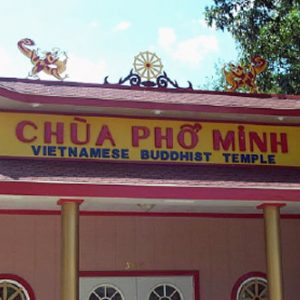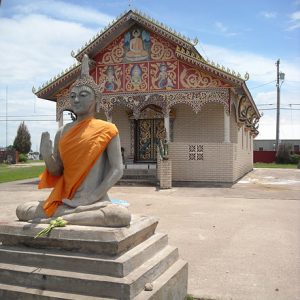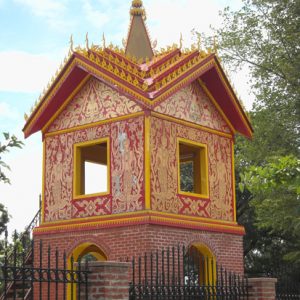calsfoundation@cals.org
Buddhists
Buddhists in Arkansas are represented by ethnic immigrants who bring to the state the religious practices of their homelands as well as native Arkansans who have turned to Buddhism for their spiritual needs. Though less than one percent of the population of Arkansas, Buddhists in the state have established temples testifying to their presence, in addition to meeting in a variety of formal and informal groups.
Buddhism can be described as a religion, a philosophy, a psychology, a practice, or a way of life. Buddhism’s essentially non-theistic framework, along with its emphasis on personal experience as the only true validation of its teachings, sets it apart from most other religious systems. Despite the varied schools of Buddhist thought and practice, the central focus of Buddhism is on the elimination of individual suffering through training the mind. The foundation of all Buddhist thought is summarized in the Four Seals of Buddhism: 1) all composite phenomena are impermanent; 2) all tainted emotions (emotions that arise out of ignorance, hatred, or craving) are painful and cause suffering; 3) all phenomena are empty of inherent existence—that is, phenomena arise only out of interdependence on other causes and conditions; and 4) Nirvana (escape from the cycle of death and rebirth) is true peace.
There are at least two Buddhist temples in Arkansas serving primarily Laotian immigrant communities: Wat Buddha Samakitham in Fort Smith (Sebastian County) and Wat Lao Thepnimith Xaimongkoon in Springdale (Washington and Benton counties). Wat Buddha Samakitham, the largest in the state; was founded in 1989 and, by 2001, had ten permanent monks and occupied six acres of land. Fort Smith also became home to two Vietnamese Buddhist temples, the foremost of which is Chùa Phô Minh. Fort Smith temple Wat Lao Buddharam was destroyed by fire on March 5, 2015. In 2005, the Chùa Bat Nha temple in Bauxite (Saline County), which serves a predominately Vietnamese community, opened.
The oldest and largest Buddhist society in Arkansas not associated with a particular ethnic or immigrant group is the Ecumenical Buddhist Society of Little Rock (Pulaski County), founded by Anna Cox, Jay McDaniel, and Charles Hicks; this group, which began meeting in the late 1980s and was formally established in 1993, accommodates a variety of Buddhist traditions. In Fayetteville (Washington County), Barbara Taylor founded the Morning Star Zen Center (associated with the Korean Kwan Um school) in 1986. Other small practice groups were founded in northwest Arkansas during the 1990s and 2000s, including the Buddhist Meditation and Spiritual Support Group, founded by Geoff Oelsner in 1996; the Fayetteville Soto Zen Center, founded by Jack McDowell in 2000; and the Unitarian Universalist Buddhist Fellowship, founded by James Ownbey and Jerry Walsh in 2004. There is record of one Harmony Buddhist Mission, founded in Clarksville (Johnson County) in 1954 by Dr. Frank Newton, who later published a translation of the Dhammapada, a sacred Buddhist text, under the title The Path to Virtue (1971). However, little information is available about the history of this mission.
One of Arkansas’s most famous Buddhists was death row inmate William Frank Parker, a double murderer who converted to Buddhism while in prison and impressed many with the depth of his personal transformation. He was briefly a cause célèbre among American Buddhists, with the Dalai Lama and actor Richard Gere among the hundreds calling for clemency, before he was executed by lethal injection on August 8, 1996.
In the fall of 2006, Geshe Thupten Dorjee, a Tibetan monk in the Gelug tradition, accepted a position at the University of Arkansas (UA) in Fayetteville, teaching courses in Buddhist philosophy, Tibetan culture, and non-violence. Outside of his university duties, Geshe Dorjee provides Buddhist teachings through several groups and organizations, including regular teachings at the Tibetan Buddhist Practice Group led by Pam Dramis. In 2007, Geshe Dorjee, Professor Sidney Burris, and others founded the Tibetan Cultural Institute of Arkansas, which is “dedicated to helping the Tibetan people preserve their culture within the emerging global village.” The Tibetan Buddhist presence in Arkansas is also manifest in the Katog Choling Mountain Retreat Center (Katog Rit’hröd) in Newton County, which was founded by abbot Khentrul Lodrö Thayé Rinpoche and includes a small cave temple; the land was consecrated in 2010.
Because of the diversity and lack of formal hierarchy within American Buddhism, statistics are difficult to gather. One source estimated the number of Buddhists in Arkansas in 1990 at 0.2 percent of the total population. Buddhism remains one of the very smallest religions in the United States and in Arkansas; at the same time, however, there is an indication that the religion is one of the fastest-growing in the Western world.
For additional information:
Barbee, Eric. “Pluralistic Society.” Arkansas Democrat-Gazette, November 24, 2001, pp. 4B–5B.
Buddhark. http://buddhark.com/ (accessed October 3, 2022).
“EBS Revolves around Buddhist Meditation.” Arkansas Democrat-Gazette, March 23, 2003, p. 4B.
Ecumenical Buddhist Society of Little Rock. http://www.ebslr.org/ (accessed October 3, 2022).
Leveritt, Mara. “‘Simple, Unelaborate Living.’” Arkansas Times, May 11, 2011, pp. 10–12, 14–16. Online at http://www.arktimes.com/arkansas/simple-unelaborate-living/Content?oid=1694295 (accessed October 3, 2022).
Sack, Kevin. “Awaiting Execution, and Finding Buddha.” New York Times, May 29, 1996, p. 12A.
Storm, Christine. “Exiled Monk Teaches UA Students Simple Life.” Arkansas Democrat-Gazette, June 30, 2007, p. 5B.
Tibetan Cultural Institute of Arkansas. http://www.artibet.com/ (accessed October 3, 2022).
Weissberg, Elizabeth. “They Moved to a Buddhist Retreat in Rural America. Have They Found Happiness?” The Guardian, May 17, 2023. https://www.theguardian.com/us-news/2023/may/17/buddhism-arkansas-retreat-meditation-mindfulness (accessed May 17, 2023).
James S. Ownbey
Unitarian Universalist Buddhist Fellowship of Fayetteville
Staff of the CALS Encyclopedia of Arkansas
 Buddhist Temple
Buddhist Temple  Buddhist Temple
Buddhist Temple  Buddhist Temple
Buddhist Temple 



Comments
No comments on this entry yet.